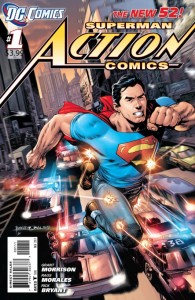This past weekend I toured a couple of comic shops. One was my local favourite (Blue Beetle), the other was a comic shop in downtown T.O. I thought I would just check things out. See what was in stock. Get a feel for what was selling. See what was already sold out. The comic shop in Toronto was already sold out of Action Comics #1. But I did hear something at one of the comic shops: there was a limit to the amount of #1s a customer was allowed to buy. This wasn’t shocking, I don’t mind limits, it allows everyone to get a copy. But the limit was because too many copies were showing up on eBay for inflated prices. When I heard this my jaw dropped. This statement shocked me. My first thought is “What do you mean I can’t sell this?”
Growing up watching television and movies in the 80’s taught me one thing, this is a free market society. We have the right to do what we need to do to make a living. Sometimes that even means exploiting people. Now wait… before you get angry at that statement, it is true. The whole idea of commerce is the exploitation of another person. If you knew how much something cost from the wholesaler or the manufacturer it would make you sick to see how much you pay at retail. For me personally, I don’t sleep well at night if I think I’ve taken someone in a deal. I have sold many items to friends and on eBay, and I rarely make any profit on anything I sell. It just doesn’t sit well with me. So there you go, there’s my personal stance on it. But if someone buys a copy of Action Comics #1 at their local comic shop, goes home and puts it on eBay for $10 (essentially tripling their money), I don’t see an issue with this.
I don’t have a problem with someone tripling their money on eBay for a couple of reasons. First, you don’t have a gun to your head when you are making a purchase on eBay. If you are in an auction, you can set your upper limit so you won’t pay more than you want. If it is a “buy it now” item, you know the cost right up front.
Second, some people live in really remote regions. They may not even have a comic shop within 200 kilometers of their house. If you look at it that way, $10 for Action Comics #1 is pretty cheap when you consider location, travel and availability. Also no matter how much advertising is done, no matter how much recognition a store has, some people like to buy online. The individual may just feel more comfortable buying an expensive comic from eBay.
Third, the seller has the right to sell anything for any price. If someone wants to sell Action Comics #1 for $10, you can. If someone wants to sell a “Free Comic Book Day” comic for $10 (even though they got it for free) they can as well. It’s commerce and it makes the world go round.
I’ve been trying to think of reasons why the comic book shop would be upset about this. Is the retailer upset because somebody is getting “hosed”? Is the retailer upset because they could’ve sold the same comic to that eBay customer for regular price? For an inflated price? There is nothing preventing a comic shop from opening their own eBay account and selling comics at whatever the going price is.
The only problem I see coming would be a few years down the road. The “customer” who bought this theoretical $10 Action Comic #1 will have a surprise if they try to sell it. I can see them going into a comic shop thinking it will be worth $50, $60 or more, and will get a shock when the comic may be worth the $10 they spent (or maybe less). I know comic shops see it all the time now with Spawn #1 or McFarlane’s Spider-Man #1. Some day any of the DC new #1’s could be on that list too.




Ed, I think that people will disagree with your use of the word exploitation. Free market enterprise can be exploitative, but it isn’t always.
Comic Shop Owner A sells Action #1 to Customer B for $4. Customer B then sells Action #1 on eBay for $10 to Customer C. In this interaction A makes a profit, B makes a profit, and C gets the product they want. That isn’t exploitative. A and B both have costs that will eat into profit’s so it isn’t simply a matter of pocketing the difference.
The limit imposed is good because it enables A to provide the product to C without a middle entity B. Without a limit B is able to purchase many copies and inflate the price for C. A is still technically happy because his/her profit is the same but has to deal with unhappy Cs who can’t get the product as the regular price.
Yet if you really wanted Action #1 you probably had it saved for you at your local comic shop. So the C group that is buying Action #1 online either where unable to save a copy, live remotely as you suggested, or plan on reselling at a later date to make more money. I too have no problem with people reselling items, but a shop isn’t limiting purchases because they are miffed they didn’t sell the book for $10.
There is nothing wrong with a comic shop limiting sales to curb resale. Not because they are standing behind free enterprise, but because they are providing better customer service to a larger group of customers.
Ed, do you feel the same way about sketches? Why didn’t you chime in on Anthony’s post considering this is essentially the same topic.
http://www.comicbookdaily.com/columns/whosoever-holds-this-hammer-blogs-2/selling-sketches/
My argument has always been for a universal truth and so, in principle, I’m in agreement with what you’re saying. My issue with Kevin’s position was that there is no fair way to govern the process without netting the legitimate fans as well. I know there are unethical opportunists out there but to try and retaliate against these kinds of people in the ways that have been suggested is not a system that works.
In your case, it’s also important to note that many of the new books listed on eBay are from dealers and retailers. I’ve had similar experiences locally where shops would jack up the price of popular books or claim that they were sold out when in fact they simply wanted to list them on eBay themselves or claim that they got a new shipment but would have to charge me a huge premium for the new batch. When the All Star Batman and Robin “potty mouth” misprint hit the shelves, one dealer tried to sell me his copy for $100. Ridiculous! I was patient and waited for the fervour to die down and now I’ve got 10 mint copies which I picked up for about $5 each.
However, I do disagree with this comment:
The whole idea of commerce is the exploitation of another person.
I think “exploitation” is the wrong word and I assume what you wrote is not what you meant.
^_^
Yay! Speculation overtakes an initiative to reach out to new readers and increase sales… how awesome is the comics community? How fast can we kill the DCnU by taking the books out of the hands of readers to make them pay premium prices? Makes the high digital price seem like a reasonable alternative than dealing with the Entitled world of the profit-minded collectors.
Our shop is limiting to 2 per person only so that we have lots of comics to go around so that everyone has an equal chance of getting a copy. That’s really the only reason I think is fair to limit how many a person wants to buy.
I just would hate to see some poor kid who was SO excited to read Batman #1 be left disappointed because some jerk bought 50 copies. That’s why we’re limiting.
Maybe the word exploitation shouldn’t be applied to this context, but any transaction between retailer and customer is exploitation.
I work in an industry (besides writing for CBD) where the product needs to pass through 3 retailers hands before it winds up at the end customer. One time by accident a drop shipment showed up with an invoice from the original supplier. The product cost the end user $150. The original supplier sold the item for $5.35EUROS. This was a case where the final mark up was 300 times.
This is exploitation of the final customer. The poor customer has to pay too much for the final product. It may not be the best word for comics, but for my regular work-life it fits.
To Charlie – Anthony had a great column. I feel that a commissioned sketch should not be resold. It is a personal item that was created under agreement between the artist and customer. I don’t think it’s fair to sell something that was created for someone.
As far as a finished art page, the personal connection isn’t there and it could be resold.
In the case of DC number 1, DC would let the books be returned if they are not sold. I think a retailer should take the opportunity and order lots of books, let everybody buy as many as they want. But it takes capital to buy those books to be eventually returned. So I understand why a retailer would have limits, but I wish they didn’t.
Forgive me Ed but let me see if I understand you correctly:
• Company makes comic, sells to fan. Fan resells = Good.
• Creative sells comic page to fan. Fan resells = Good.
• Creative sells sketch to fan. Fan resells = Bad.
I have to say, you have me at a disadvantage because I didn’t realize that there were any agreements involved. I’ve always just paid for my purchase, then moved on. Since I don’t actually have any agreements with my past purchases, I guess I’m in the clear.
Let’s see how this compares with Kevin’s logic:
• Company buys art, prints it, sells to fans, makes money = Good.
• Creative sells art to fans, makes money = Good.
• Fanboy buys art, sells to other fanboy, makes money = Bad.
Okay, I think I’m understanding this better now:
• Company or creative makes money = Good.
• Fanboy makes money = Bad.
Got it.
Kevin clearly does not like speculators… but lets look at the role of speculators in comic history:
• Comic books are sold at the corner store.
• Back issues become popular and speculators help give birth to the comic store.
• Speculators need a place to sell their books so markets are formed, now referred to as cons.
• Speculation bubble, fueled by publishers, bursts.
• Speculators help solidify online venues, including CGC.
• Interest in back issues wane so cons and stores shift their focus to related merchandise.
Seems to me that comic speculators are getting a bum rap despite having helped established the comic market. How about other industries…
• Speculators help establish the west during the gold rush.
• Speculators discover oil and help establish a multi billion $$ industry.
• Speculators help create the art market, the stock exchange and even Hollywood.
So throughout history, across many markets… western civilization was been built on the spirit of speculation. Wow!
So just to sum up…
• Companies, cons, vendors make money from fans = Good
• Fans make money from fans = Bad
So the message to collectors is: Do not be “profit-minded”, do not try to make money from this industry. Leave the exploitation to the publishers and the event organizers.
To quote Hannibal Lectre: “can you hear the lambs Clarice?”
Speculators killed the hobby a little less than 20 years ago just as they nearly killed the sports card hobby – when publishers and retailers court speculator dollars it has been the history of this hobby that eventually people get burned when the gravy train of speculation runs out. Retailers over order and are left with unsold merchandise, publishers think they are reaching new readers when they are selling to speculators, etc. It creates a false positive.
A secondary market with true demand is not a bad thing, but when we rush out and buy multiple copies creating the illusion of reader support In order to stir up bigger dollars on eBay, store owners are given an inaccurate picture and how do they anticipate for orders on the next issues?
Further, what people are doing here is another form of flipping – Trying to make short term profits before the second and/or third printings make the racks. In less than 6 months the books are dead on the secondary market anyways… killed by trade paperbacks and hardcovers.
As we all know, speculation was urged on by publishers and they continue to do so. They would like nothing more then to rekindle the fire that was the 80’s. But like most fires, it eventually burns itself out. Any conscious person could see the 90’s coming from a mile away but what surprised me was how succinct it was.
I’m been burned by the wrong kinds of people and by making the wrong decisions but I don’t blame anyone but myself. I see speculators for what they are and they don’t just exist on the convention floor but in every aspect of this business.
So my point is… if you can accept greed at the business level, then you should be able to accept greed at the consumer level. Or better yet, why not “poo poo” greed all together?
Much good and much bad has come from speculation. That’s it’s nature. However, a double standard is a form of hypocrisy that I find hard to swallow.
Hannibal: Then something woke you, didn’t it? Was it a dream? What was it?
Clarice: I heard a strange noise.
Hannibal: What was it?
Clarice: It was… screaming. Some kind of screaming, like a child’s voice.
Hannibal: What did you do?
Clarice: I went downstairs, outside. I crept up into the barn. I was so scared to look inside, but I had to.
Hannibal: And what did you see, Clarice? What did you see?
Clarice: Lambs. The lambs were screaming.
Hannibal: They were slaughtering the spring lambs?
Clarice: And they were screaming.
Ed is right in saying there is no gun pointed at our heads when purchasing on Ebay, or anywhere for that matter, but this instantaneous inflation of price is tanking the market.
You talk about mark up of retail items, and how the percentage from wholesale to list price is unsettling, but you have no problem with that same tactic being used to sell a week old comic online for that same increased percentage, and lets not forget “plus shipping”. With comics we know the original cost and should have a problem with the mark up. In the case of Free Comic book day books, most of them I see has “not for resale” printed on them somewhere.
I’m not trying to be argumentative, but I DO have a problem with this New 52 situation, it’s getting a lot of hype in the mainstream because everyone thinks it’s a chance to jump on a collectible number one. As a reader and collector I won’t stand for it and will be very vocal about it. I have mentioned before this feels like the 90’s all over again. I could go on and on, probably already feels like I am, but I wish books were valued for their significance and not their hype.
why do a person have to be a jerk to want to buy more than 1copy of a comic he my want to give one to someone else or sale to someone who can’t keep to the comic shop.
I’m with Laura. She trumps. Thanks Laura